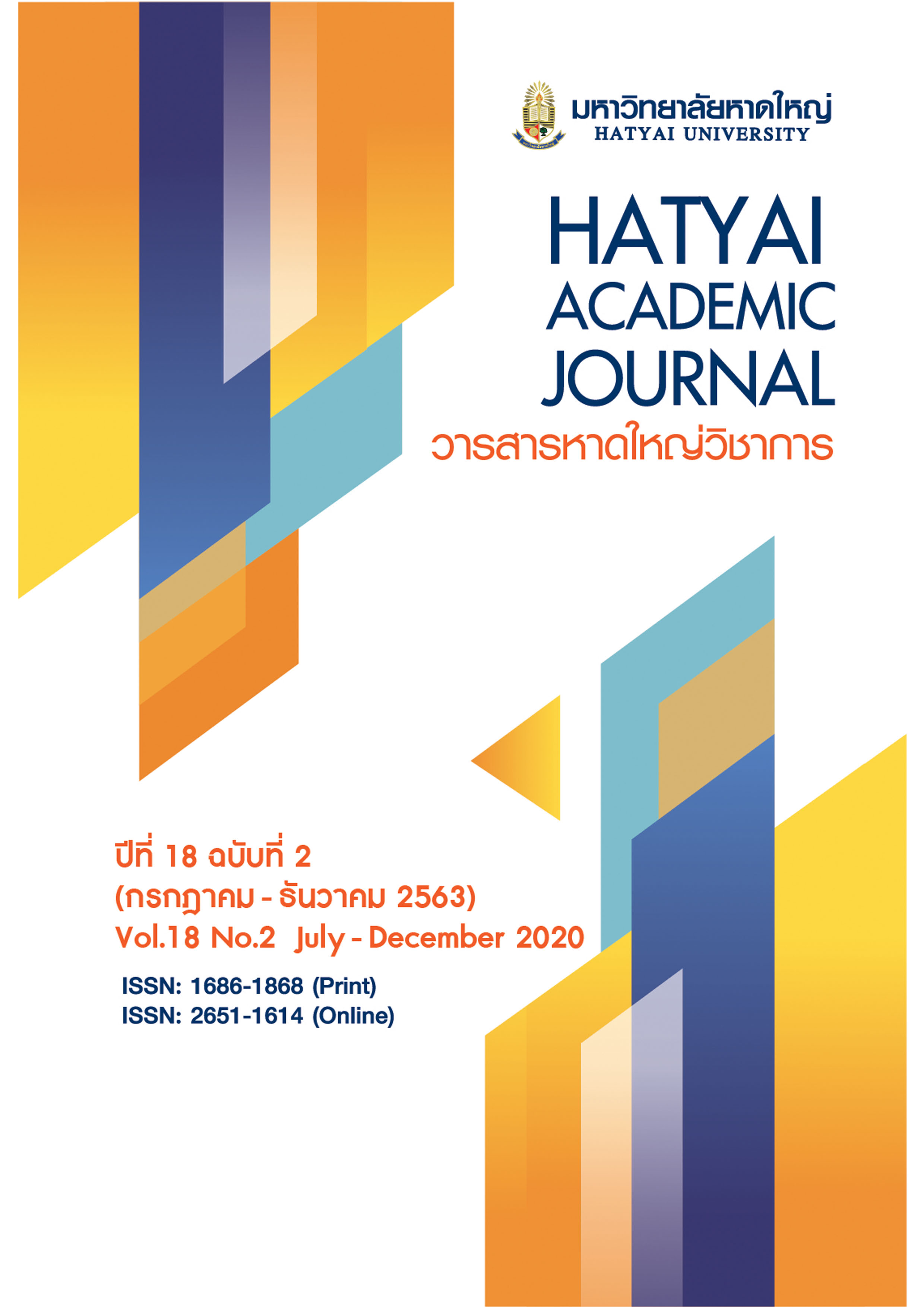Elements and Conditions of Instructional Behavior for Pre-service Teachers’ Learners in The Digital Era: A Perspective from the Involved Parties Perspectives from Those Involved.
Main Article Content
Abstract
This research was to search for and understand elements and conditions of instructional behavior for pre-service teachers in the digital era. This qualitative research employed a technique of purposive selection to determine its total number of 39 key informants. The informants, those who were involved in the pre-service teacher development process, included executives of the Teachers’ Council of Thailand, deans of the Faculty of Education, university supervisors (eight), school administrators, mentor teachers (five), pre-service teachers (11), and elementary students (15). Data were collected by in-depth interviews and focus groups. Content analysis was carried out. The research revealed that:
1. Elements of instructional behavior for pre-service teachersconsisted of (1) a learning activity designed previously before teaching, (2) which was following the learners’ learning styles, needs, and nature, (3) a supportive learning atmosphere, (4) multiple types of learning achievement-based tests and assessments, and (5) feedback skills to stimulate learning.
2. The conditions of the behavior consisted of personality including (1) self-confidence, (2) self-efficacy, (3) the experience of teaching success, (4) the teacher’s anxiety about the experience, and (5) adaptatibility during the experience of professional teaching in schools. Environmental conditions included: encouragement given by intimate friends, and positive reinforcement, learners’ differences, and the workload.
Article Details
All published articles are evaluated by three qualified peer reviewers from various institutions through a double-blind process, where reviewers do not know the authors’ identities and authors do not know the reviewers’ identities. The content and articles in the Hatyai Academic Journal reflect the authors’ views only and are neither the opinions of the editorial board nor the responsibility of Hatyai University. The Editorial Board of the Hatyai Academic Journal allows articles to be reproduced for academic purposes, on the condition that the original source is clearly cited.
References
Aiemyeesoon, P. (2011). Problems and guided development in professional experience training of teacher students from faculty of Arts Education Bunditpatanasilpa Institute. In National academic conference the 1st Rajamangala University of Technology Suvarnabhumi. Rajamangala University of Technology Suvarnabhumi, Phra Nakhon Si Ayutthaya. [in Thai]
Bandura, A. (1986). Social foundations of thought and action: A social cognitive theory. Englewood Cliffs, NJ: Prentice-Hall.
Bundasak, T., Chaowiang, K., & Jangasem, N. (2017). Happily learning among nursing students. Journal of MCU Peace Studies, 5(1), 358-368. [in Thai]
Cakmak, M. (2011). What are prospective teachers ‘opinions about their instructors’ teaching styles. Procedia-Social and Behavioral Sciences, 15, 1960-1964.
Chalarux, N. (2015). The teacher’s role and instruction in the 21st century. Journal of FEU Academic Review, 9(1), 64-71. [in Thai]
Chutabhakdikul, N. (2015). Digital generation. Encyclopedia of Education, 50(2558), 79-83. [in Thai]
Creswell, J. W. (2015). A concise introduction to mixed method research. Thousand Oaks, CA: Sage.
Faikhamta, C. (2010). The study of professional training experiences for pre-service science teachers in five years program according to learning reform. Bangkok: Office of the Higher Education Commission and The Thailand Research Fund. [in Thai]
Faikhamta, C., & Roadrangka, V. (2000). Problems in professional experience training of student teachers in the project for the promotion of science and mathematics talented teachers (PSMT). Songklanakarin Journal of Social Sciences and Humanities, 11(2), 151-163. [in Thai]
Gerdruang, A. (2017). Empowering learning in the 21st century for Thailand society in the digital age. Journal of Lampang Rajabhat University, 6(1), 173-174. [in Thai]
Jongjaisurathum, S. (2016). Mixed methods research of multilevel causal factors of self-regulated learning of mathematics influencing mathematics achievement of mathayomsuksa 3 students (Doctoral dissertation). Srinakharinwirot University, Bangkok. [in Thai]
Khlib-ngoen, W. (2013). The development of a mentoring social media technology blended model for pre-service teachers professional experience practices (Doctoral dissertation). Silpakorn University, Nakhon Pathom. [in Thai]
Lamsupasit, S. (2015). Theory and behavior modification techniques. Bangkok: Chulalongkorn University Press. [in Thai]
Laohajaratsang, T. (n.d.). Learning in the next era: the form and future technology. Retrieved form http://thanompo.edu.cmu.ac.th/load/journal/50-51/Cteachers.pdf [in Thai]
Phanit, W. (2012). Learning path for students in the 21st century. Bangkok: Sodsri-Saridwongso Foundation. [in Thai]
__________. (2015). Transformative learning. Bangkok: Siam Commercial Foundation. [in Thai]
Seehanat, J. (2016). The development of creative writing ability for primary education 6 students based on scaffolding with motivation of thinking question and mind mapping methods (Master’s thesis). Rajamangala University of Technology Thanyaburi, Pathum Thani. [in Thai]
Sinlarat, P. (2011). Sattasila Seven new educational perspectives and seven out-of-the-box instruction. Bangkok: Dhurakij Pundit University. [in Thai]
Soithong, S. (2000). Relationships among knowledge of Thai language of student teachers in Rajabhat Institutes, Bangkok metropolis (Master’s thesis). Chulalongkorn University, Bangkok. [in Thai]
Taewattana, T., Chetchareonrak, S., & Wiriyanon, T. (2012). Scaffolding theory for learner support in an online learning. Journal of Industrial Education, 6(1), 1-11. [in Thai]
Tschannen-Moran, M., & Hoy, A. W. (2001). Teacher efficacy: Capturing an elusive construct. Teaching and Teacher Education, 17(7), 783-805.
Vanichatanavorachai, S. (2015). Differentiated instruction. Journal of Education, Silapakorn University, 13(2), 65-75. [in Thai]
Vygotsky, L. S. (1978). Mind in society: The developmental of higher psychological process. Cambridge, MA: Harvard University Press.
Wiangwalai, S. (2013). Learning management. Bangkok: Odeon Store. [in Thai]
Wongtakom, S. (2018). Developing of early childhood education students’ confidence in the presentation by giving award for positive reinforcement teaching technique. CMU Journal of Education, 3(1), 42-58. [in Thai]
Wongyai, N. (2017). A guide to developing digital Literacy skills of digital native. Journal of Veridian E-Journal, Silpakorn University (Humanities, Social Science, and Arts), 10(2), 1630-1642. [in Thai]


